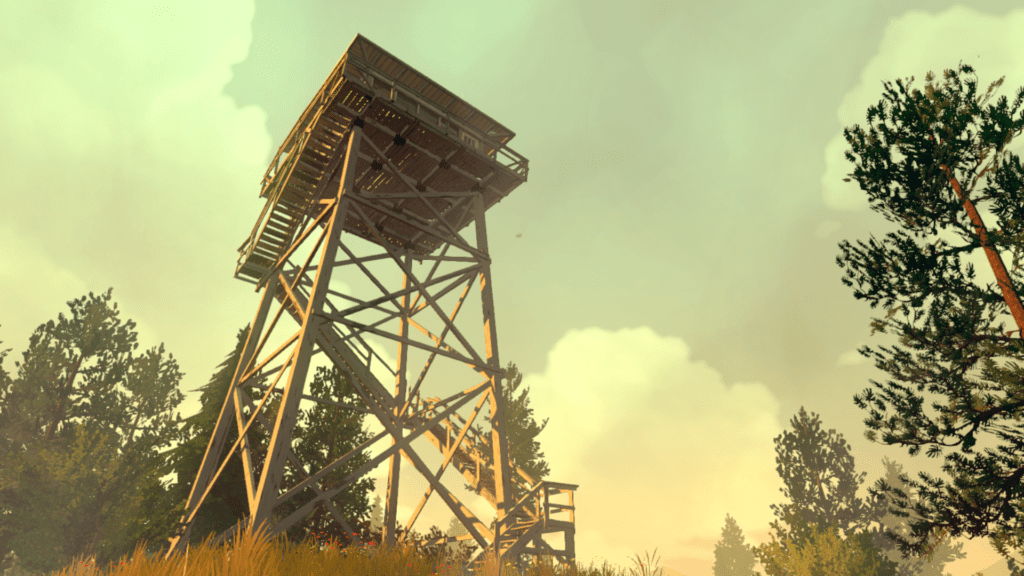What starts with the tender blossoming of a relationship – all from the modest beginnings of heavy-handed drunken flirtations on the part of our protagonist, Henry – ends without the dreamy romance that the opening text crawl began to promise. Henry’s wife, Julia, has become stricken with early-onset dementia, and his escape is a summer spent ambling about the pines of the Wyoming wilderness as a conscript of the parks department. His way of approaching his problems is to flee the fires of responsibility and burden himself with seclusion. And it’s in his unique way of coping that Campo Santo’s maiden title, Firewatch, really takes root.
As Henry begins to make himself comfortable with his surroundings, his primary acquaintance in an adjacent watchtower – fellow lookout, Delilah – and the day-to-day responsibilities expected of his position, Firewatch begins to set itself up as a sort of catharsis for a man torn between the guilt of abandoning his stricken wife, whilst also seeking the answers required to move his life forward. The forests of Firewatch are Henry’s purgatory, and Delilah is the only outlet upon which Henry may project his insecurities – if he so chooses.
But there’s a point not too far into the game where Henry’s illusion is severed, a point where Firewatch unravels in an instant to present itself in an entirely different nature. This duality ceases Henry’s cathartic wandering, drastically alters his growing relationship with Delilah and even has the player begin to question the very basis of the game’s objective. From the moment that Henry happens upon Delilah uttering the words “No, I don’t think he has any idea” during a time when outbound communications are meant to be down, the resulting tonal shift casts a looming shadow that lingers all the way to the end credits. Henry: beleaguered, troubled and in search of direction, now becomes deprived of any further time to think as he trades roaming the park reflectively instead for pursuing a supposed spectre.
This splinter at the game’s crux works because the longer it simmers, the more it has you doubt the sanity of the protagonist. The premise of it all is just conspiratorial enough to make Henry seem at breaking point – you begin to wonder of the toll that his wife’s state has had on him mentally, whether all this is some sort of lucid haze that his conscience has cooked up as a necessary route of escapism. But there are plenty of arrows pointing to the many deceptions of Henry, most of which are orchestrated by Delilah.
For deeply buried in the Wyoming thicket is a testament to Henry’s sanity – and a less-than comforting affirmation of what a person will go to in order to avoid facing the truth. Delilah’s deceit is in the bones of Brian Goodwin, still lying at the bottom of the jagged pass from which he fell. And still living is the father of Brian who witnessed his son’s death, but out of fear of misunderstanding, refuses to return back to society. Delilah harbours him in the park now. This is her Firewatch. Henry was only ever in the way.
DRIVEN BY FEAR, IT’S EASY TO SYMPATHISE WITH HENRY’S UNKNOWING
And as Henry’s wife Julia and Delilah’s friend Brian were left alone, so shall they be. The lookouts left to tend to watering potted ferns and checking off crossword clues in their towers when they’re not trekking in the woods below performing necessary maintenance and procuring supplies. Firewatch hits the right notes in this respect, not losing itself entirely to the sudden shift in direction by keeping the juxtaposed parallels evident enough to make it seem less like two half-games. Delilah runs from responsibility just as Henry does – but her folly is that she has left it too late. Henry still has time, and Delilah, for all her mistakes, helps him understand this. We never meet Delilah because she is Henry’s future within the context of his indecision. We never meet her because, unlike Henry, she never reaches the end of her metaphorical watch. She comes back again and again. Same cabin, same crossword puzzles.
Even as the relationship between Henry and Delilah teeters upon lies and deception, the dialogue between the two remains ceaselessly brilliant. Wonderfully acted and perfectly evocative of two characters that we come to know only through audio, Henry has the poise of someone funny, likeable and witty, but never less so than that of any other person in the room. That is until Delilah gradually opens up to him, quickly proving to be more than his equal across the board and rarely showing as much as a chink in her armour, but coming across as genuinely endearing and heartfelt even beneath a torrent of lies and deflections. The chance to choose your own response gives great agency to the player, and the ensuing threads of conversation that follow in the wake of a sharp riposte or a playful jab feel just as natural as they are inherently emblematic of Henry’s humour or Delilah’s vitriol.
But even as the air of uncertainty threatens to taint the Firewatch woodlands, its many groves and nooks remains steeped in idyllic splendour. The soft-touch art style that forms the basis of the game’s aesthetic is aptly befitting of its mellow solitude. Baked beneath the calming pastel suns and cool skies, Firewatch boasts several impressive palettes that each embolden its luscious scenery with minimal effort. And though its level of detail is eroded away by shading techniques that focus predominantly on enlivening colour, smaller items such as maps and notes offer a welcome focus upon the lashes of detail beyond that of the quaint scenery.
Although it was quick to reach its end, the story that Firewatch told never lost itself within its mystery, instead remaining an approachable story of coping and grief played out by characters who never seem anything but human. The melding of Henry and Delilah’s conflicts was a necessary detraction. To reverberate their mistakes off of one another helped them reach the conclusions that they required. And the backdrop was just that – a forest, a fire and little else. Everything else that Henry and Delilah needed they found in each other, for better or for worse.

